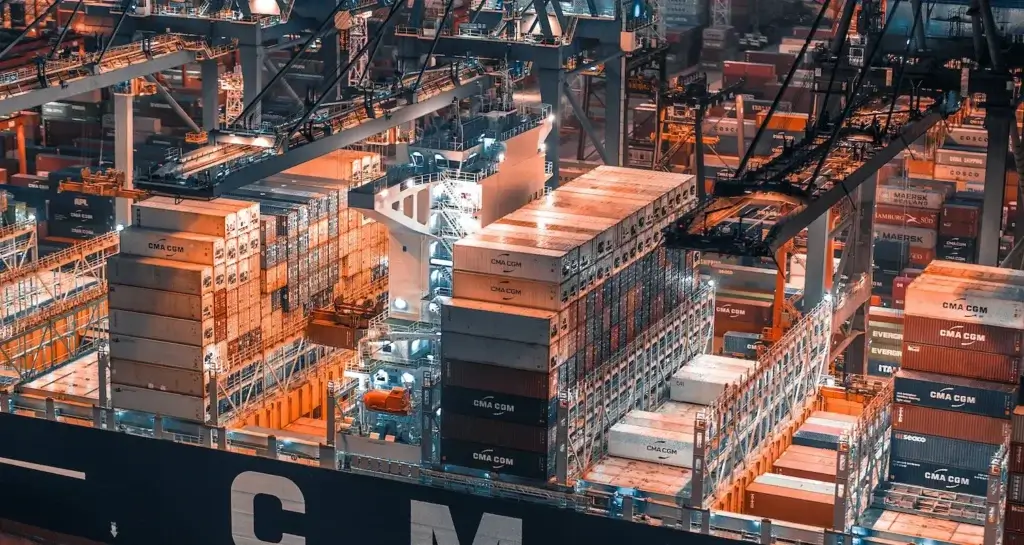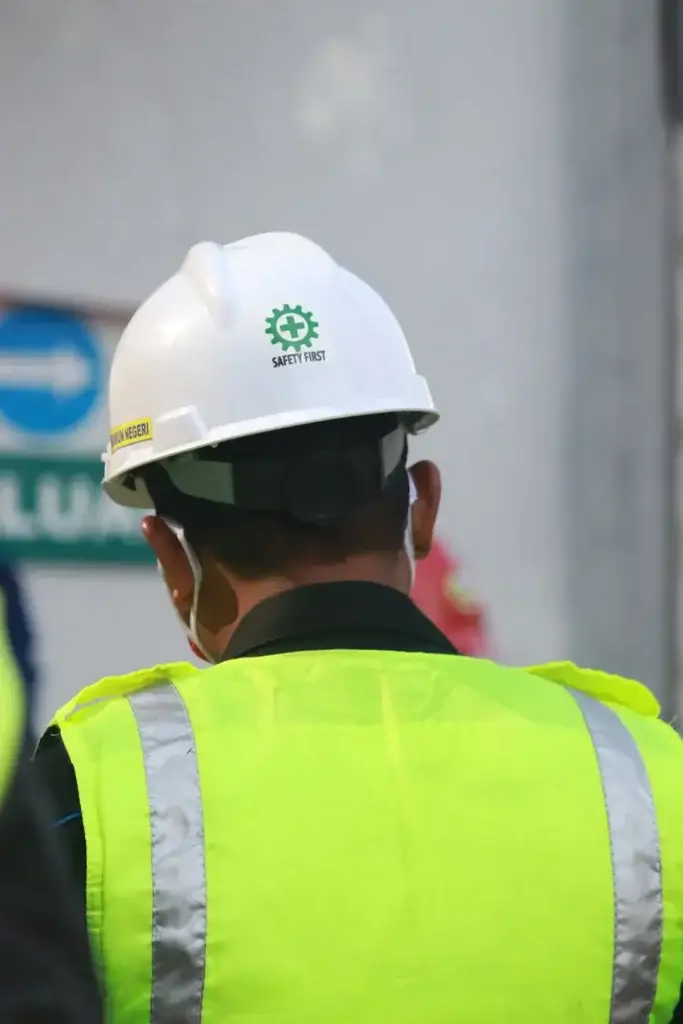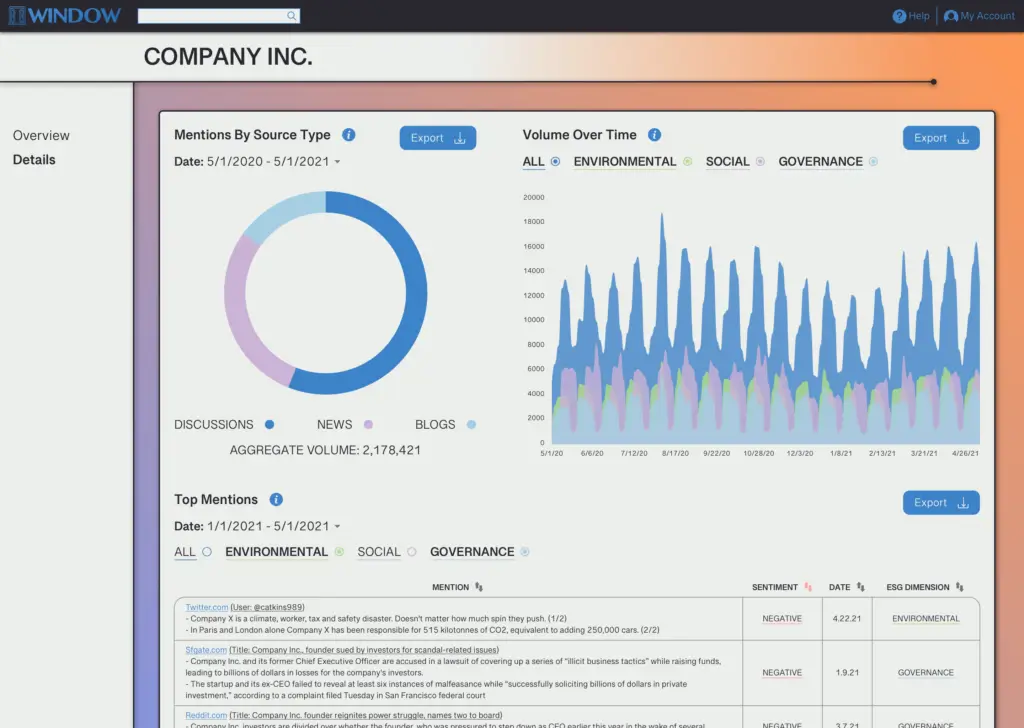Supply Chain Sustainability Software
Window’s supply chain sustainability software allows organizations to manage their relationships with suppliers in a way that ensures they meet their sustainability goals and commitments to all stakeholders.
With the increased attention placed on supply-chain transparency, clients, customers, governments, investors, and the public increasingly view supply chain relationships as the responsibility of the purchasing organization.
According to a 2016 study by global consulting firm McKinsey, “A company’s supply chain typically accounts for 80% of greenhouse-gas emissions and >90% of the impact on air, land, water, biodiversity and geological resources.”
The demand for supply chain accountability has been growing for the past decade or more, but the impact of the COVID-19 pandemic has increased pressure to make sustainable supply chains a strategic priority.

Manage Supply Chain Risk With Alternative Data
To ensure a more sustainable supply chain and manage supplier risk, the most impactful activity an organization can engage in is to collect and analyze data on its suppliers.
Unfortunately, most supply chain software relies on collecting and analyzing the representations suppliers make.
This approach, however, is flawed, because it relies on suppliers telling the truth to purchasing organizations. Instead of taking suppliers at their word, Window collects textual data from across blog posts, news articles, and social media to determine risk based on what companies actually do – and the public’s perception of these activities – rather than just relying on what they say.
Data Collection and Analysis
Window sources textual data from news articles, forums, social media, and blogs and applies textual analysis using its proprietary Natural Language Processing algorithms to detect risks in company supply chains before they become incidents.
Window’s textual analysis capabilities do not just track supplier mentions and sentiment, but also emotions and the credibility of commenters.
Ensure Compliance with Supply Chain Regulations
While the culture is shifting towards a stakeholder model of capitalism that requires sustainable supply chains, organizations must navigate new regulations intended to increase accountability.
These regulations include the UK Modern Slavery Act, the U.S. Trade Facilitation and Trade Enforcement Act, the Paris Agreement, and the EU Non-financial Reporting Directive.
Supply chain legislation and the definition of “sustainable” have moved far beyond preventing corruption or avoiding organizations that use child labor or support modern slavery. Regulators now view their mandate as the promotion of a net-zero carbon future – as well as other initiatives that depend on the jurisdiction.
And there is more to come: the EU recently announced a new legislative initiative putting in motion an EU directive on Corporate Due Diligence and Corporate Accountability.
As the definition of supply chain sustainability shifts and expands, many sources of data are necessary to ensure compliance and to communicate with suppliers before risks get out of control.

Satisfy Demands for Corporate Social Responsibility
In addition to legislative pressure, companies must also respond to demands from consumers, shareholders, and employees to account for the impact of their supply chains on human rights and the environment.
Companies like Apple, Nike, Zara, and Reserved have long made headlines over working conditions in their overseas supply chains, and car-sharing apps such as Uber and Bolt have faced increasing scrutiny over the treatment of drivers and delivery personnel.
However, these demands go beyond journalistic muck-raking. Many investors now demand that corporations provide accountability with respect to corporate social responsibility (CSR) – which includes accountability for their supply chains. In one recent study, most firms sampled were approached with at least one such proposal per year.
On a parallel track, employee resource groups (ERGs) are increasingly aggressive about demanding that management act in ways they deem socially responsible. This presents difficulties for management, as ERG demands can change quickly as the political and social situation changes over time. However, due in part to a tight labor market in Western countries, companies have been increasingly responsive to employee requests for CSR initiatives.
This aggressive posture by employees has led to changes in firm behavior even without direct pressure by employee activists.
The decision by General Motors in 2020 to reorganize its plants to make ventilators during the pandemic was not the result of overt pressure by employees.
During the recent advertising boycott of Facebook, Instagram, and Twitter due to continued problems with hate speech on social media platforms, the story is similar. Unilever and Coca-Cola did not wait for ERG pressure to participate – they simply acted.
While their participation may reflect the values of their management teams, it is also the case that, in the struggle to find and retain talent, companies cannot allow supply chain or vendor scandals to interfere with employee engagement or recruiting.

